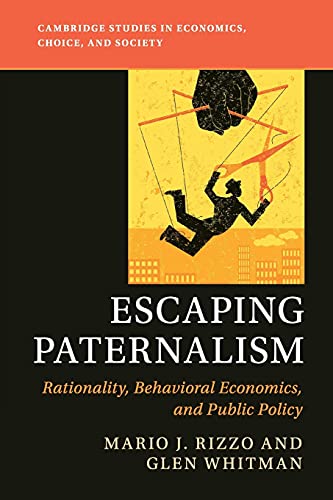Escaping Paternalism
Rationality, Behavioral Economics, and Public Policy (Cambridge Studies in Economics, Choice, and Society)
Mario J. Rizzo; Glen Whitman
BOOK REVIEW

In an era where reliance on paternalistic policies seems constant, Escaping Paternalism: Rationality, Behavioral Economics, and Public Policy emerges as a beacon of clarity and enlightenment, shattering the myths that often bind our understanding of free choice and decision-making. Authored by Mario J. Rizzo and Glen Whitman, this formidable text dives deep into the intersection of rationality, behavioral economics, and public policy, delivering a powerful critique against the underlying assumptions of paternalism in decision-making.
Rizzo and Whitman challenge the prevailing notion that individuals, when left to their own devices, will invariably make erroneous decisions requiring intervention. Their thesis? We are not just passive recipients of information and direction but are equipped with the rational faculties to navigate our choices. This audacious claim ignites a necessary debate about empowerment versus enforcement, urging readers to reflect on their own capacities for self-determination. Are you, as a citizen, genuinely incapable of making decisions that are in your best interests?
The authors weave together historical context with contemporary examples, illustrating how paternalism often stifles personal responsibility. They argue that by undermining individuals' judgment, we risk not just diminishing personal agency but eroding the very fabric of a free society. This text is not merely an academic exercise; it's an urgent call to rethink how public policies can empower individuals rather than dictate terms.
As you navigate through almost 500 pages of compelling arguments and analysis, you'll find your perspective transforming, grappling with what it means to trust in the rational capabilities of people. Have you ever felt that uncomfortable tug of frustration when facing overly protective policies? Rizzo and Whitman articulate those sentiments eloquently, giving voice to a widespread yearning for autonomy and respect.
Readers have responded to this exploration with fervor-some embracing the authors as champions of individual rights, while others question whether such faith in humanity is misplaced. Critics have raised valid concerns about the nuances of behavioral economics, arguing that our decision-making can often be clouded by irrational biases. However, the brilliance of Escaping Paternalism lies in its ability to spark such discourse, inviting both praise and critique in equal measure.
In a world where public policies often operate under the guise of benevolence, Rizzo and Whitman challenge us to confront the paternalism that lies beneath that veneer. They compel you to question: is it truly for our benefit, or is it a mode of control disguised as care? Within these pages, you'll discover invaluable insights into your rights, your capacity for rationality, and the systemic changes necessary to foster genuine empowerment.
It's not just an academic treatise; this book is a catalyst for revolutionary thinking. Whether you are a policymaker, an economist, or an engaged citizen, Escaping Paternalism calls upon you to engage in a reimagined dialogue about freedom and responsibility in our society. Embrace the discussions that will unfold, reflect on your own preconceived notions, and prepare for an intellectually invigorating journey that may well redefine your understanding of both economics and individual autonomy. Are you ready to escape the chains of paternalism? 🌟
📖 Escaping Paternalism: Rationality, Behavioral Economics, and Public Policy (Cambridge Studies in Economics, Choice, and Society)
✍ by Mario J. Rizzo; Glen Whitman
🧾 506 pages
2020
#escaping #paternalism #rationality #behavioral #economics #public #policy #cambridge #studies #economics #choice #society #mario #rizzo #MarioJRizzo #glen #whitman #GlenWhitman